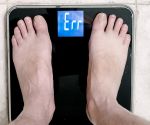Advertisement
In general, you should weight yourself about once a week or every other week. If you are trying to lose weight once a week is best. If you weigh yourself too often you may be discouraged by normal fluid shifts. It is best to weigh yourself in the morning, before breakfast. This is considered your true weight, and is the most accurate measure.
If your goal is weight loss, it is recommended that you weigh yourself no more than once per week, and if your goal is increased lean body mass, the recommendation is once every two weeks. It is important when attempting to lose weight not to weigh yourself too frequently. Due to water weight fluctuations and the rate at which you lose body fat, weighing yourself more than once per week can be discouraging. In weight loss, depending on how many calories you are consuming and burning, recommended weight loss is one to two pounds. Considering the slow pace at which healthy weight loss occurs, weighing yourself anymore frequently than once per week will likely not provide you with the immediate positive feedback you are looking for. When you weigh yourself, in order to be as accurate as possible, you should keep certain variables constant such as the scale you use, the time of day you weigh, the day of the week, and the articles of clothing you wear. It is important to not take any single weigh-in too seriously. This means that whether you have not lost any weight at all, or have lost more rapidly than expected, do not adjust your program until you see the trend occur two weeks in a row. Because weight gain typically comes on more slowly, one half to one quarter of a pound per week, weighing yourself more frequently than once every two weeks can also provide misleading results. When weighing yourself with the intention of lean body mass gains, the same variables and recommendations should be applied as in weight loss.
Continue Learning about Weight Guidelines
Important: This content reflects information from various individuals and organizations and may offer alternative or opposing points of view. It should not be used for medical advice, diagnosis or treatment. As always, you should consult with your healthcare provider about your specific health needs.





